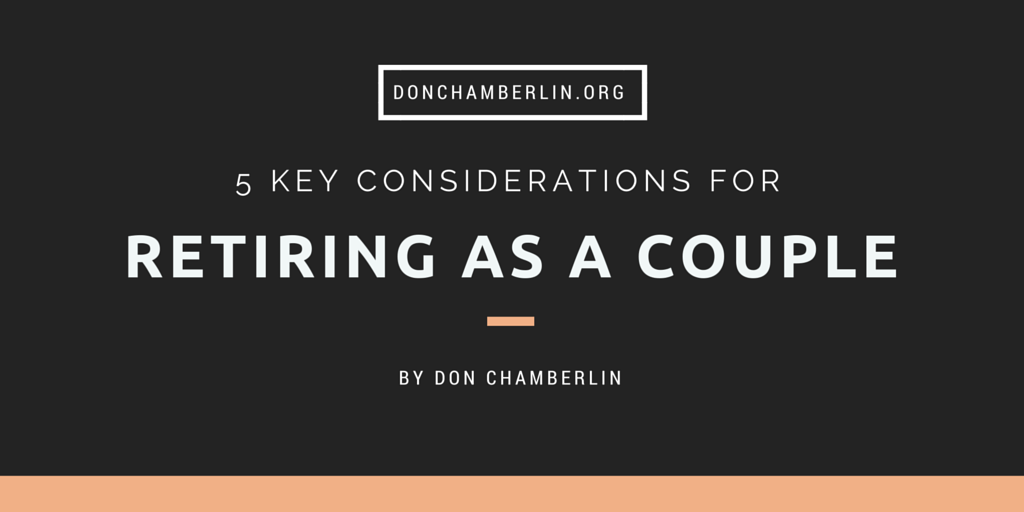When planning for retirement, there are a lot factors to take into account like the age at which you want to retire, the income you require, and the future expenses you foresee. When you’re planning on retiring with a partner or spouse, your partners individual circumstances, health, goals, savings, and debt can all simplify or (more likely) complicate your retirement dreams. It’s important to sit down and make a plan together that will ensure both of you are able to retire in the best manner possible.
With so much to consider, it can be hard to know where to start. To get you started, here are four important aspects to discuss and find alignment on.
Individual Goals
It’s surprising how most people don’t really think about how they want to retire until it’s about to happen. But it’s crucial that you have these conversations before you retire, otherwise you might not be properly prepared to support the retirement you want.
Begin by asking both yourself and your partner these basic questions:
- When do you want to retire? (Does one of you want to keep working longer than the other?)
- Where do you want to live? (And what is the relative cost of rent/goods there?)
- How much do you expect your essential month-to-month expenses to cost (housing, food, utilities, entertainment, transportation, etc)?
- What kind of lifestyle do you want to have? (Do you want to go out to dinners, movies, and shows regularly or do you plan on spending most of your time doing activities around the house?)
- How much do you want to travel (for both adventure and family purposes)? (Do you have relatives you know you will want to visit that are far away? Do you have a list of countries you’ve always wanted to visit once you had the time?)
- What kind of hobbies or projects do you want to start? (How much time/money do you want to spend on gardening, refinishing the house, fitness classes, etc.)
- How much do you expect to spend on other people (gifts for family, educational costs of children or grandchildren, medical expenses of unwell family members, etc)?
Getting a better picture of how you expect your average day, month, and year of retirement to be will make planning for the financial realities of it much simpler. It will also help you prioritize what’s most important and know where to cut if you end up having to make some sacrifices.
Account options
Once you figure out the “how much” you need to figure out the “where.”
Being a couple, you may end up with more and/or better options that if you had been planning for retirement alone. If you are thinking of your retirement days as a partnership, then you should be thinking of your retirement savings as a partnership, too. Examine all your options from every angle.
Does one of you have access to a 401(k) with matching dollars? You just found your top priority (for the both of you!) If you each have access to your own, you probably want to contribute as much as you can to fully take advantage of both.
Next, discuss your other account choices: do either of you already have a Traditional and/or Roth IRA? Should you start one? Depending on if you are married or not, you may choose to allocate your funds in one fashion or another.
Factoring in your age now and your expected date of retirement, you should be able to figure out where your combined savings efforts will get you the farthest by the time you want to begin withdrawing funds. You should also get a better idea of how much of your individual incomes you will need to contribute to these accounts each year until then.
Taxes
Taxes are extremely important when you are considering to save collectively! You both need an individual and collective strategy in place for when and where to access your funds. Ideally, you want your retirement resources to come from a variety of tax treatment, such as tax-deferred funds found in plans like IRAs and 401(k), tax-free funds in Roth accounts, and even already-taxed funds in brokerage accounts.
This mix of distributions will minimize your tax burden and allow you to hold onto more for retirement.
Beneficiary designations
Here’s an important fact many people either forget or simply neglect: the beneficiaries on your retirement accounts and life insurance trump your will.
This means that if you go through a divorce, re-marry, and forget to change your beneficiaries, you could end up leaving a big sum to your ex while neglecting to take care of your current loved one as well as you could have.
Keeping your designations up to date as your family evolves over time is important.
Planning for the good and bad
No one likes tragedy, but unfortunately some things we simply can’t control. While no couple likes thinking of a day where they could divorce or one of them could unexpectedly pass away, preparing for the worst will make dealing with these situations in reality a lot less awful.
Planning starts with a simple, though sometimes uncomfortable, conversation topic: money. As important as it is to understand both you and your partners financial situation, more people than you think avoid ever talking about money. In fact, an astounding 43% of couples can’t identify their spouse’s salary.
While we may worry that discussing how much our spouse makes is somehow “rude,” it’s actually the financially responsible thing to do. In case tragedy hits, you must be aware of your spouses financial details, account logins, and paperwork, or you could be left alone and untaken care of.
Final Thoughts
Remember, through all of this planning: you are a team. The end goal is to make sure that both of you are taken care of in the way you want to be. Proper planning, compromise, and a common goal are going to be important for your retirement in the same way they are for your relationship in general.

